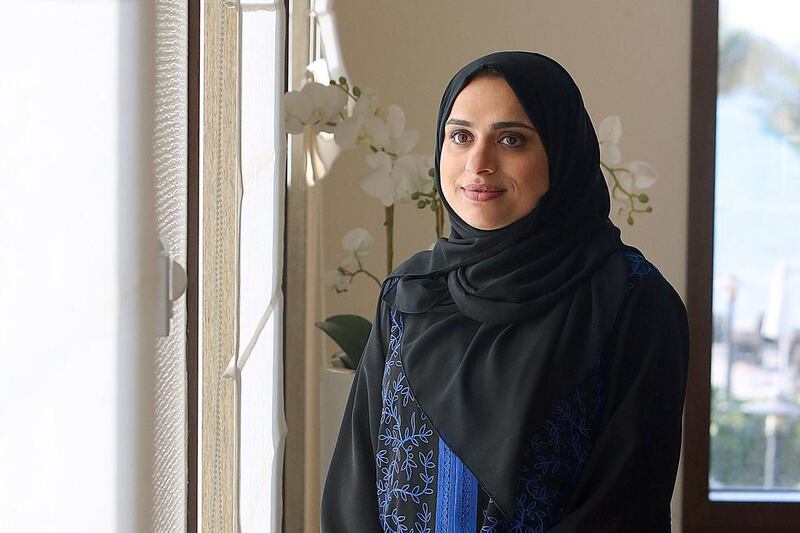In 2008, Shamsa Saleh was pregnant with her first child. She was working at the Dubai International Financial Centre as vice-president of corporate strategy at Nasdaq Dubai but was struggling to find the work-life balance she was striving for.
“Back then the nature of work and the financial setting for me as a married and working woman meant working very long hours, and required travelling overseas because of my involvement in international projects,” says Ms Saleh, now the chief executive of Dubai Women Establishment (DWE).
“That helped my ambition but then I got a call from DWE that they needed a female strategist to work on unique projects. I saw that one of the pillars they were focusing on was work-life balance. I saw this as time for me to satisfy my ambition and yet have the work-life balance that I am looking for without affecting my family or putting my future plans on hold.”
Eight years since taking the helm of DWE – a statutory Dubai government body set up in 2006, which encourages the participation of Emirati women in the workforce and society – Ms Saleh is now enjoying the flexibility she once longed for as well as the fruits of her labour.
“The strategy of DWE was really attractive for me as a working woman because apart from a career, I am fulfilling a greater mission to help women. This is an important mission that, I think, everybody – every woman – appreciates,” says Ms Saleh, 35, now a mother of three. “We have contributed to making women’s lives better and retaining these women in the workplace and contributed to offering their children a better environment where they are happy, relaxed and satisfied.”
Emirati women, in general, are increasingly participating in the labour force, although still at a rate lower than men.
While 46.5 per cent of the total Emirati population of Dubai is economically active, around 32.1 per cent of those are females, according to a 2012 Labour Force survey by the Dubai Statistics Centre.
And a 2012 report by the consultancy Booz & Company, now called Strategy &, revealed that the UAE economy could benefit enormously from more women in the workplace: raising female employment to male levels could have a direct effect on GDP of 12 per cent.
Ms Saleh also believes more can be done to persuade Emirati women to join the workforce, something DWE is actively involved in.
“Our vision and leadership direction is to fulfil the gender gap in the region and have women participate in every field,” says Ms Saleh, who studied information technology and then focused on a diploma in strategic planning, as part of the first batch of Zayed University graduates.
One initiative is the women leadership programme launched in 2009. DWE built a database of women who are capable of holding the levers of power in the private and public sector.
It also enrolled a batch of women in a leadership exchange programme with Sweden, with senior Swedish and Emirati professional women from the government and private sector spending two weeks in Sweden completing courses on leadership skills. In the second phase, DWE welcomed the Swedish participants to Dubai, where they visited leading companies to learn from their best practices.
“This gives UAE women leaders the opportunity to open a dialogue with international women and benefit from their experience and learn from the success stories. It also helps us to change the perception that people in the West have about Arab women,” says Ms Saleh. “There are some negative stereotypes we need to correct and it has been built because of certain practices in neighbouring areas.”
The female labour force participation in the Middle East and North Africa region as a whole remains low at 26 per cent, compared with 35 per cent in South Asia, 64 per cent in East Asia and the Pacific and 61 per cent in Sub-Saharan Africa, according to a 2012 World Development report published by the World Bank.
“The biggest challenge is the time you need to change people’s perception and the women’s belief in themselves and their capabilities,” says Ms Saleh. “Spreading the concept of women participating in society and the economy, it takes time.”
To help raise awareness, DWE is organising the Global Women’s Forum in Dubai for the first time in the Middle East. The forum, taking place on February 23 and 24 at Madinat Jumeirah, will host more than 2,000 participants and 200 speakers from different sectors, including Christine Lagarde, the managing director of the IMF. The theme of the forum is innovation.
“The strategy of the UAE is to build the culture of innovation in the nation and adopt innovation as a part of the lifestyle for each and every individual in the country,” says Ms Saleh. “Also we have the agenda of filling the gender gap. Matching these two subjects together on an international platform will really give it a great result and outcome.”
dalsaadi@thenational.ae
Follow The National's Business section on Twitter





